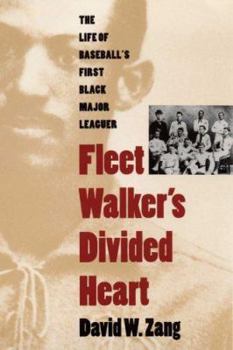Fleet Walker's Divided Heart: The Life of Baseball's First Black Major Leaguer
Select Format
Select Condition 
Book Overview
Moses Fleetwood Walker was the first black American to play baseball in a major league. He achieved college baseball stardom at Oberlin College in the 1880s. Teammates as well as opponents harassed... This description may be from another edition of this product.
Format:Hardcover
Language:English
ISBN:0803249136
ISBN13:9780803249134
Release Date:January 1995
Publisher:University of Nebraska Press
Length:171 Pages
Weight:1.20 lbs.
Dimensions:0.8" x 6.5" x 9.5"
Customer Reviews
2 ratings
A truly remarkable life filled with accomplishment and frustration, triumph and tragedy
Published by Thriftbooks.com User , 17 years ago
It will come as a surprise to most baseball enthusiasts, but Jackie Robsinson was not the first African-American to play baseball in a major league. That honor fell to Moses Fleetwood Walker who achieved college baseball stardom while a student at Oberlin College in the 1880s. But Walker was expelled from professional baseball because of the devastating and pervasive racism of the day, including ill treatment by his team mates, his opponents on the field, and Cap anson, a star of the Chicago White Stockings, who drove Walker and the few other African-Americans in the major leagues out of the game, where blacks wanting to play baseball formed the Negro League teams and were excluded from the major league teams until Robinson's barrier breaking inclusion so many years later into the exclusive club that was professional major league baseball. Walker was more than just a gifted baseball player. In addition to being an outstanding athlete, he was also an inventor, a civil rights activist, an author, and an entrepreneur. Born on October 7, 1856 in Mt. Pleasant, Ohio, Walker died on May 11, 1924 in Cleveland, Ohio. "Fleet Walker's Divided Heart" is a superbly written and enthusiastically recommended biography by David W. Zang of a truly remarkable life filled with accomplishment and frustration, triumph and tragedy, and which now has made into an audiobook CD featuring the impressive narrative talents of Andrew L. Barnes.
Zang rescues Moses Walker from undeserved obscurity
Published by Thriftbooks.com User , 26 years ago
To properly understand the Twentieth Century American civil rights movement, one must understand how and why a similar movement failed during the Reconstruction years following the Civil War. Likewise with baseball history--to properly appreciate Jackie Robinson breaking the major league color line in 1947, one must understand the less salutary 1884 experience of Moses Fleetwood "Fleet" Walker.Walker, born of middle class mixed-race parents in Ohio in 1857, attended and played baseball at integrated colleges in the early 1880's. In 1883 he left school to pursue a professional career with the minor league Toledo Blue Stockings. Baseball teams of the era determined whether to employ African Americans on a team-by-team basis, and Walker's presence on Toledo drew only occasional attention from fans and opponents.In 1884 the major league American Association absorbed Toledo as an expansion team. Walker, by then an excellent defensive catcher, followed his team into the Association to become the first black major leaguer. Injuries hobbled Walker, however, and eventually cut his season short. The Toledo club folded after the season.Walker returned to the minor leagues in 1885, but faced hardening racial prejudice which blocked his return to the majors. In 1889 the minor International League, in which Walker then played, joined the majors in adopting an unwritten, unofficial color line. By then Walker's career was winding down anyway.Walker's subsequent life defies easy characterization. He patented four inventions, published a book, and owned a successful opera house--but also struggled with alcohol, served jail time for stealing from the U.S. mails, and stood trial (but won acquittal) for his role in a knife fight.Author Zang integrates Walker's varying experiences into the larger mosaic of declining race relations in the America of his era. Indeed, Zang often ventures too far from the facts of Walker's life--interesting enough in their own right--into airy sociological speculation. He perhaps over-emphasizes Walker's mixed-race parentage as bringing about the "divided heart" of his title. His book nonetheless serves as a valuable testimonial to a fascinating and forgotten life.






